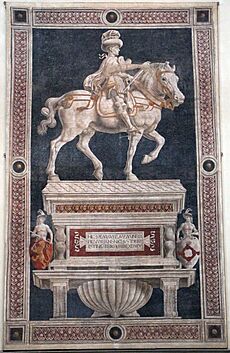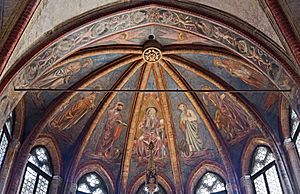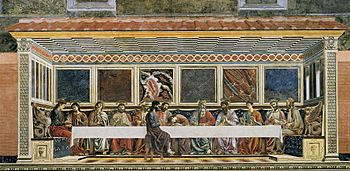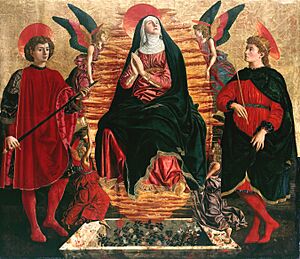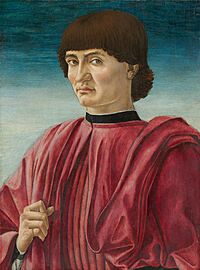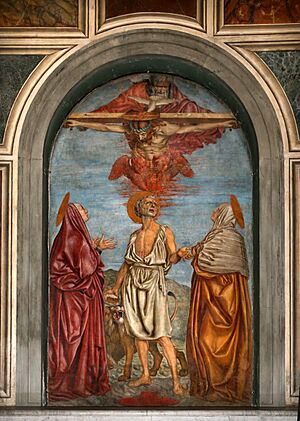Andrea del Castagno facts for kids
Andrea del Castagno (born around 1419 – died August 19, 1457) was an important Italian painter during the Renaissance in Florence. He was greatly inspired by famous artists like Masaccio and Giotto di Bondone. Some of his most well-known artworks include frescoes (wall paintings) in the Sant'Apollonia church in Florence and a painted statue of Niccolò da Tolentino in the Florence Cathedral. His style also influenced later artists from the School of Ferrara, such as Cosmè Tura and Francesco del Cossa.
Quick facts for kids
Andrea del Castagno
|
|
|---|---|
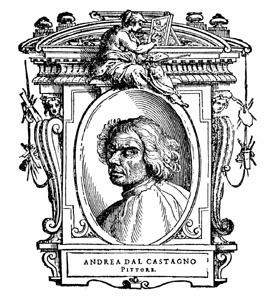
Portrait of Andrea del Castagno in the Lives by Vasari (1568)
|
|
| Born | c. 1419 Castagno, near Florence
|
| Died | 19 August 1457 (aged 37–38) |
| Nationality | Italian |
| Movement | Italian Renaissance painting |
Contents
Life of Andrea del Castagno
Early Years and Training
Andrea del Castagno was born in a small village called Castagno d'Andrea, close to Florence. He moved to Florence in 1440 under the care of Bernadetto de' Medici, a powerful family.
We don't know much about how he learned to paint. Some people think he might have studied with other famous painters like Fra Filippo Lippi and Paolo Uccello. In 1440–1441, he painted a fresco called Crucifixion with Saints. This painting showed his skill with perspective, which is making things look three-dimensional on a flat surface. This skill was inspired by Masaccio.
In 1442, Andrea traveled to Venice. There, he painted frescoes in the San Tarasio Chapel inside the church of San Zaccaria. He also worked in St Mark's Basilica, where he painted the Death of the Virgin.
After Venice, he returned to Florence. He designed a beautiful stained-glass window for the Duomo, Florence's main cathedral. In 1445, he became a member of the Guild of the Medicians. This was an important group for artists.
The Last Supper Fresco
In 1447, Castagno created one of his most famous works. He painted a large fresco of the Last Supper in the dining hall of the Sant'Apollonia convent in Florence. Above it, he painted other scenes from the story of Christ, like the Crucifixion and Resurrection.
The Last Supper shows how talented Andrea del Castagno was. He painted with great detail and made the figures look very real. This was a new and exciting style for the time. It is believed that Leonardo da Vinci saw this painting before he created his own famous Last Supper.
Later Works and Famous People
Between 1449 and 1450, Andrea painted the Assumption with Saints Julian and Miniato. This painting is now in Berlin.
Around the same time, he worked with Filippo Carducci on a series of paintings called Illustrious People. These were portraits of famous figures for the Villa Carducci at Legnaia. The series included well-known writers like Dante Alighieri, Petrarch, and Giovanni Boccaccio. It also featured historical figures like Pippo Spano and Farinata degli Uberti.
Other works from this period include a Crucifixion in London. He also painted David with the Head of Goliath and a Portrait of a Man. Both of these are now in Washington.
In 1455, Andrea del Castagno worked in the Basilica della Santissima Annunziata. Here, he painted frescoes like the Trinity with Saints Jerome, Paula and Eustochium. These paintings showed his strong, realistic style. In 1456, he painted the Equestrian Monument of Niccolò da Tolentino in the Florence Duomo. This painting was similar to one by Paolo Uccello that showed Sir John Hawkwood.
A False Story
A famous artist and writer named Giorgio Vasari once wrote that Castagno murdered another artist, Domenico Veneziano. However, this story is not true. Domenico Veneziano actually died four years after Castagno passed away from the plague. This false story sadly affected Castagno's reputation for many years.
Images for kids
See also
 In Spanish: Andrea del Castagno para niños
In Spanish: Andrea del Castagno para niños
 | Kyle Baker |
 | Joseph Yoakum |
 | Laura Wheeler Waring |
 | Henry Ossawa Tanner |


